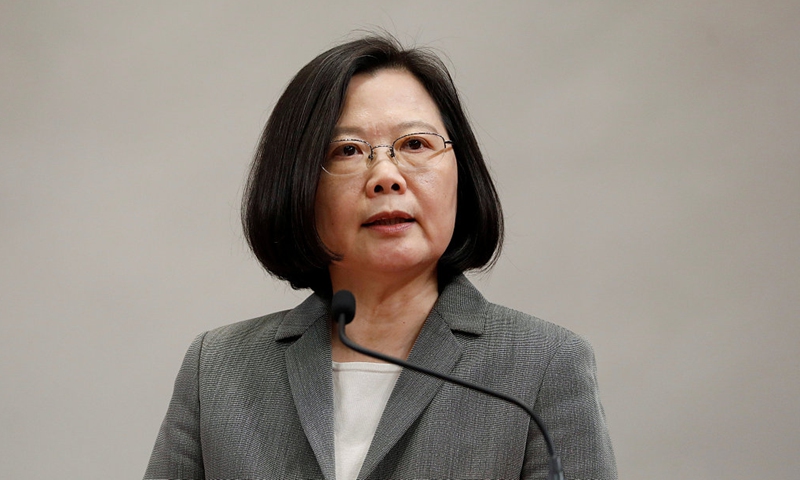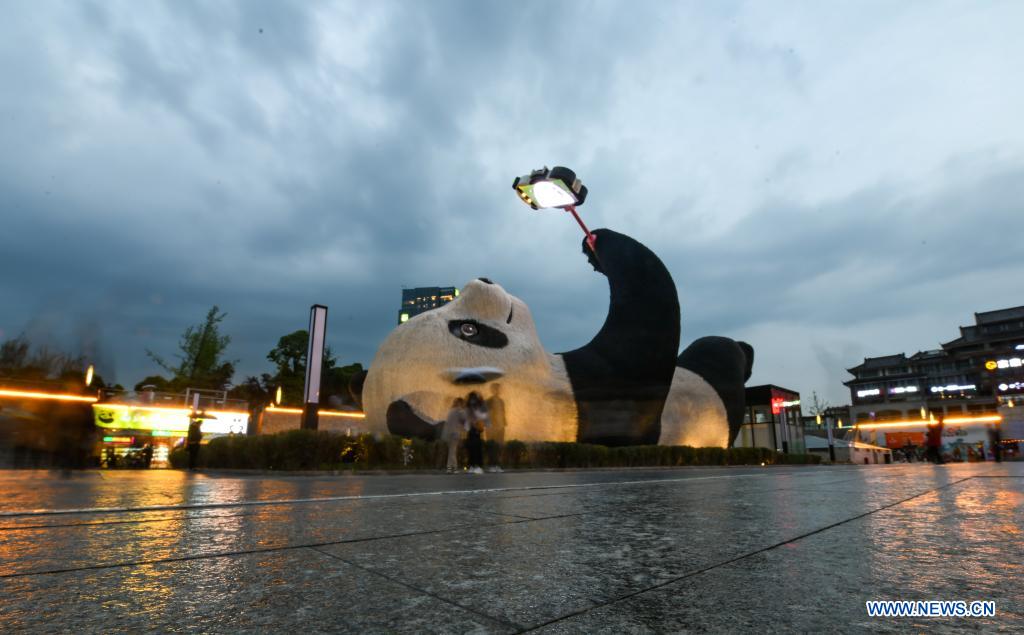New guidelines on US-Taiwan interactions ‘harassment’, not ‘turning point’: observer

Tsai Ing-wen
The US Department of State announced on Saturday (Beijing time) that it has issued new guidelines for US government interaction with counterparts on the island of Taiwan to encourage US government engagement with the island that reflects their "deepening unofficial relationship."
Observers from both the mainland and Taiwan said on Saturday that although the Biden administration will continue playing the "Taiwan card" to pressure China, an apparent "ceiling" exists no matter how big the "breakthrough" the White House seems to have made is. Observers believe the new guidelines are a move from Washington to test how the Chinese mainland will react, but there will not be a qualitative change to the relations between the US and the island of Taiwan.
A US State Department spokesman said the new guidelines meant, for example, that working-level meetings with officials from the island were now encouraged in US federal buildings and could also take place at Taiwan's representative offices, according to a Reuters report on Saturday.
As of press time, the US State Department has not issued a detailed document of the new guidelines. Lü Xiang, a research fellow on US studies at the Chinese Academy of Social Sciences, said that what content the new guidelines include does not matter but to what extent the new notions will be implemented does.
"The 'Taiwan card' is the last card the US has to contain China. So Washington will be very careful before really using it. The US will prefer having the card in hand to make it effective in the long term," Lü told the Global Times on Saturday.
If the US sends officials on the same level as the Secretary of Defense to the island, or if Taiwan regional leaders from the defense authority and external affairs authority are received in any federal buildings, then that will mean the US has completely crossed the line on the Taiwan question, and China's countermeasures must be unprecedented, Lü noted.
Chang Ya-chung, a Taipei-based political scientist and member of the Kuomintang (KMT), also said the "Taiwan card" is a good card for the US so it will fully take advantage of the island of Taiwan to serve its own strategic interests.
A report on the Financial Times website shortly before State Department spokesman Ned Price's statement over the new guidelines quoted a US official as saying there would still be some "guard rails," such as not allowing officials to attend functions at Twin Oaks on major Taiwanese holidays that might complicate the US' "One-China" policy.
"The US will improve its relations with Taiwan as much as possible, but it will never break the ceiling to regard the island as a 'country,'" Chang said.
"The US' new guidelines are just a move to provoke the Chinese mainland and further enchant the Democratic Progressive Party (DPP) to make it feel good," Chang continued, noting that the new guidelines cannot be seen as a "turning point" in US relations with Taiwan island.
According to Chang, only when the US completely "tears its face" with the Chinese mainland and transforms its relationship with the island of Taiwan from an unofficial relationship to an official one, can it be called a structural change - now it is just an act of harassment.
Former US Secretary of State Mike Pompeo announced days before the end of former President Donald Trump's presidency in January that he was lifting restrictions on contacts between US officials and officials from the island of Taiwan. But no real moves were implemented. Besides, the Trump administration canceled the US ambassador to the United Nations Kelly Craft's trip to Taiwan island at nearly the last minute of its tenure.
Lü put it that the US Department of State's announcement on its new guidelines has taken a step back from what Pompeo claimed, which means there are still limits in Washington's interactions with the island. But in comparison with the existing restrictions, the new guidelines have actually moved a little further for the US in having so-called unofficial exchanges with the island. "The announcement reflects the US' self-contradiction," Lü said.
Yuan Zheng, deputy director and senior fellow of the Institute of American Studies at the Chinese Academy of Social Sciences, told the Global Times in a previous interview that there are two lessons that the Biden administration can learn from Trump's last-minute cancelation of Craft's visit.
"First, the US will bear a high risk if it irritates China on the Taiwan question. Second, the Chinese government has the firm resolve and the ability to safeguard its national sovereignty and territorial integrity," Yuan said.
In an interview with the Global Times on March 31, Yuan said, "the Biden administration will not easily discard the US' long-term 'strategic ambiguity' over Taiwan. Abandoning 'strategic ambiguity' will push the US into a dilemma, in which it will either pay a heavy price or will gravely impact its international image."
"If the US goes too far and the DPP authorities follow up, the consequences will rest on the Chinese mainland's goodwill to determine," Lü noted.
Photos
Related Stories
- Taiwan's exports to Chinese mainland hit record high in March
- China refutes U.S. "intimidation" accusations
- At least 40 feared dead in Taiwan train derailment
- Mainland spokesperson expresses condolences over Taiwan train derailment
- Train derails in Taiwan, at least 40 people feared dead
- Commentary: U.S.-Taiwan collusion tactics must stop
- Taiwan reports 6 new imported COVID-19 cases, urges strict anti-epidemic measures
- China urges U.S. to prudently handle issues regarding Taiwan question
- NASA should get Taiwan status right
- Mainland spokesperson refutes so-called "memorandum" between Taiwan, U.S.
Copyright © 2021 People's Daily Online. All Rights Reserved.










